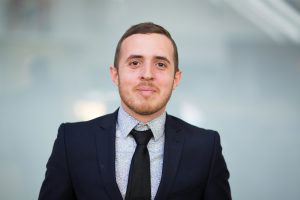General
#ClimateChangesHealth advocate Mislael Valentín-Cortés speaks for health
 This fall, the Center for Climate, Health and Equity is spotlighting the 10 health equity and climate justice champions it sponsored to attend APHA’s July 2019 #ClimateChangesHealth Speak for Health Advocacy Bootcamp in Washington, D.C. Today’s conversation is with Mislael Valentín-Cortés, an MPH/MSW candidate at the University of Michigan. Mislael is also a social scientist and public heath researcher, who studies the public health implications of climate change, natural hazards and disasters.
This fall, the Center for Climate, Health and Equity is spotlighting the 10 health equity and climate justice champions it sponsored to attend APHA’s July 2019 #ClimateChangesHealth Speak for Health Advocacy Bootcamp in Washington, D.C. Today’s conversation is with Mislael Valentín-Cortés, an MPH/MSW candidate at the University of Michigan. Mislael is also a social scientist and public heath researcher, who studies the public health implications of climate change, natural hazards and disasters.
Q: Why are you passionate about climate and health equity?
A: Growing up in an area with widespread poverty and inequality in Puerto Rico, I witnessed firsthand the impact of scarcity of resources in my community. With a changing climate and growing social vulnerability, communities in poverty have faced disastrous consequences of hurricanes, floods, droughts and extreme heat temperatures.
Having grown up in these conditions, the impacts of climate change have been central to my development as a professional and as a researcher. I recognize that health equity is vital for community resilience and adaptation to the climate crisis. By empowering the most vulnerable among our society through health equity and adaptation to climate change, we’ll be able to ensure a more equal and socially just society.
Q: How do you see climate change affecting the health of your community? What are you doing to build community resilience and health equity?
A: Warmer ocean temperatures and higher sea levels are expected to intensify the impacts of hurricanes and natural hazards, with recent analyses concluding that hurricane intensity has increased over the past three decades. My community in Puerto Rico has seen this firsthand with Hurricanes Maria and Irma that resulted in catastrophic damage to the island and exacerbated public health issues such as poverty, mental health concerns, access to healthcare and outward migration.
The long-term effects of these storms are extremely concerning. Continued energy insecurity has created greater exposure to extreme heat, especially for the older population. As a public health researcher, I’ve fiercely advocated for more attention to the ongoing crisis in Puerto Rico, mobilizing resources to the communities that need them the most and researching the long-term health implications of this disaster on the island.
Moving forward, I’m looking for opportunities to continue to study the impacts of disasters, natural hazards and climate change in Puerto Rico and beyond. We need to better prepare for and respond to the “new normal” in the era of climate change.
Q: What was the most impactful message you heard and rewarding experience you had at the two-day Speak for Health Advocacy Bootcamp?
A: The Speak for Health Advocacy Bootcamp was full of world-class leaders in the fields of climate change and public health, and the most impactful message I heard came from one of our presenters, Emily Holden, from The Guardian newspaper. When speaking about the challenges of having conversations with climate change deniers, she stated that “we must stay objective, not neutral.”
She argued that there are undeniable facts surrounding the climate crisis, and with a problem of such magnitude, we have to be strong advocates and seek to take action now. Having an opportunity to hear from such inspirational leaders was the most rewarding part of the bootcamp.
The intersection of public health and climate change is understudied and under-discussed, as was evident during our visit to the Hill, where most policy-makers admitted to treating these subjects separately, although it’s clear that climate change has profound impacts on health.
Learn more about how APHA is helping the next generation of public health professionals take action on climate change. And submit your application by Nov. 17 for the Center for Climate, Health and Equity’s new Student Champions for Climate Justice awards!


